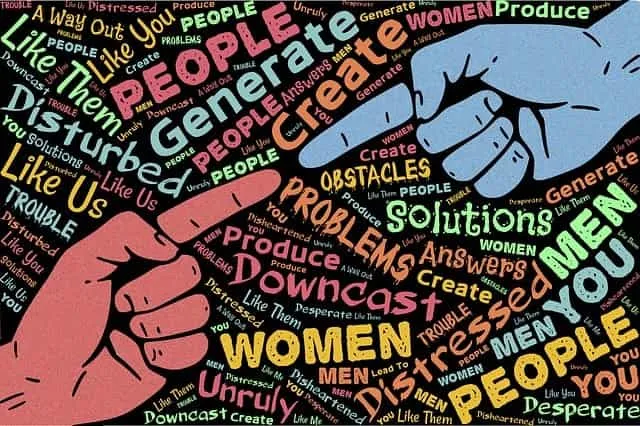
1) Active Listening: Practice attentive listening and show empathy towards your partner's perspective, Express your feelings and needs without blaming your partner. Stay open-minded and be willing to consider your partner's viewpoint, Tips for Handling Conflict in Your Relationship.
Handle As A Problem
Active listening is a communication skill that entails not just hearing what another person says but also attempting to grasp the meaning,
Techniques for active listening include:
a) Being engaged in
the discussion,
b) Making eye contact
to demonstrate interest
c) Observing,
nonverbal clues
d) Asking open-ended questions to elicit more replies
Active listening is vital in communication because it keeps you connected with your partner in a good way.
Being present in the discourse is required for active listening.
Your nonverbal behaviors are as crucial while active listening.
Taking In Hand Relationship
Use open, non-threatening body language to demonstrate that you are fully tuned in.
Making eye contact is especially vital when engaged in active listening. This shows the other person that you are present and paying attention to what they are saying.
It also demonstrates that you are not distracted by anything else.
Remember, At the same time, don't make so much eye contact that the discussion becomes awkward. Patience is an essential active listening practice because it allows the other person to talk freely.
Being patient entails resisting the urge to fill stillness with your ideas or stories.
It also necessitates listening to comprehend rather than responding.
That is, don't start thinking about a response while the other person is still speaking.
Healthy Confrontation
2) Seek Common Ground
Identify Shared Goals: Focus on the bigger picture and find common objectives that you both value, Explore mutually beneficial solutions that address both partners' needs.
Aim for resolutions where both partners feel satisfied and heard.
Setting goals does not have to be tedious. There are several benefits and advantages to setting objectives for yourself. Setting objectives helps to activate new behaviors, steer your attention, and maintain momentum in life.
If you can't manage something you don't measure, and you can't improve on what you don't manage well. Setting objectives can assist you in accomplishing all of this and more.
Goals encourage us to devise tactics that will allow us to achieve the desired level of performance.
This behavior is governed by one's objectives. According to the study, goal-setting theory suggests that the simplest and most direct motivating reason why some people do better than others are that they have distinct performance objectives.
Rather than focusing on little issues, consider how your actions will affect the overall success of a project or corporate goal.
Big-picture thinking can be critical for professional success since understanding what to focus on will help you budget your time more efficiently.
How To Work With Someone Who Creates Unnecessary Conflict
3) Respect and Empathy
Maintain a Respectful Tone: Avoid using derogatory language or engaging in personal attacks.
Try to understand your partner's emotions and perspective. Acknowledge your partner's emotions, even if you don't agree with their viewpoint.
When you spend so much time with someone, you're certain to have some disagreements, to say the least, and it's not always easy to remain impartial and levelheaded when you disagree with your spouse.
When this happens, remember to utilize these effective communication techniques with your spouse to increase the likelihood of achieving a solution that is in the best interests of the relationship.
Never point the finger at your partner. This might give your spouse the impression that you are attempting to hurt their feelings, which generally has a bad outcome.
Note - Always keep the conversation and controversy on track. Never unearth an ancient body.
In and Out Confrontation
Reopening old wounds can only result in more heated disagreements, which you should avoid at all costs.
Listening to and acknowledging your partner's feelings is the most effective method to minimize unexpected escalation of arguments.
Keep a cheerful and courteous tone. And never, ever abuse. Abusing is disrespectful and might draw more hatred, which will only escalate.
There has never been and will never be an option to retain dignity and stand firm regardless of the level of hostility.
Encoding is the process through which the sender converts ideas into communicable messages.
The communication is interpreted by the receiver, who considers both verbal and nonverbal components.
The sender's and receiver's underlying emphasis on the four aspects can be a hindrance to effective communication.
Listening to each other is the only way to establish deep, meaningful connections.
Try not to identify or analyze your observations as you express them. You must express your emotions.
Hidden emotions are frequently the source of disagreement. Make certain that you understand your feelings and that you communicate with them in a non-judgmental manner.
Relationship Guidelines
4) Take a Break:
Recognize Signs of Escalation: If tensions rise and communication becomes unproductive, take a break. Use the break to calm down, collect your thoughts, and regain emotional balance. Resume the conversation when you both feel ready to approach it constructively.
Conflicts arise when parties perceive that their respective ambitions cannot be met at the same time.
Goals, or precise aims, and standards, or acceptable minimums, are used to communicate aspirations. Three factors lead to the impression that the parties' goals are incompatible:
High expectations are more likely to spark conflict. A party's goals may be based on what they believe they can achieve or on what they believe they deserve.

Interpersonal conflict can be conveyed vocally or nonverbally in a variety of ways, ranging from a barely unnoticeable cold shoulder to a blatant meltdown.
Conflict is an unavoidable component of close relationships and may be emotionally draining.
It takes work to ignore or be passive-hostile towards someone, and the rage or remorse we may feel after yelling at someone is a genuinely unpleasant emotion.
Improving your dispute resolution skills can have a good impact on the actual world.
Because conflict exists in both our personal and professional lives, being able to handle it and negotiate good results may help us be more successful in both.
Much study has been conducted on various conflict management styles, which are communication methods used to prevent, discuss, or resolve a dispute.
The avoiding style of conflict management frequently reflects a lack of care for self and a lack of concern for others, and there is no direct dialogue about the dispute.
When we strive to avoid confrontation, we may give our sentiments away purposefully or unwittingly through our vocal and nonverbal communication.
We may choose to avoid confrontation for a variety of reasons, some of which are preferable to others.
You may be able
to reframe your viewpoint and see the situation in a new light if you are not
emotionally engaged in the disagreement.
Working Through Conflict
5) Seek Mediation if Needed:
Engage a neutral third party to facilitate, communication and help find common ground. Explore online resources, books, or workshops focused on relationship conflict resolution.
Marriage counseling and couples therapy are two prominent solutions for troubled relationships. Although many individuals confuse the two procedures, they are quite different.
Marriage counseling and couples therapy are both treatments available to couples who are experiencing stress in their relationship.
They might sound similar, but they are not. When you check the meanings of "couples counseling" and "marriage therapy" in the dictionary, you'll see that they're not the same thing.
Respond To Conflict
Marriage counseling assists couples in dealing with the difficulties of marriage. The objective is to re-establish the relationship.
It focuses on the 'present' and the challenges that couples encounter regularly.
Marriage counseling also aims to assist couples in mastering the art of communication.
Counseling can assist in mending trust or rekindling the spark. Marriage counseling is often a brief therapy, whereas treatments are a multi-session therapeutic procedure.
Couples counseling has the potential to address your problems to better comprehend the behavior you are displaying in your relationship.
Understanding the whys rather than the hows is more important. The counselor's role in marital and relationship counseling is to listen to the issues and help the couples talk through them.
Conflict Out
6) Learn from Conflict:
Growth and Understanding: View conflict as an opportunity for personal and relational growth. Reflect on recurring conflicts to identify underlying issues or communication patterns. Make a conscious effort to apply lessons learned from previous conflicts.
Conflict is a constant in life. Not everything will go as planned. All people are unique. Because of this, interpersonal interactions are inherently messy, full of unavoidable misunderstandings, disputes, and communication breakdowns.
We all learned as children that confrontation is evil, fatal, and should be avoided. We were taught at a young age that partnerships should be in a condition of harmony and tranquility.
Conflict in modern Western civilization is either avoided through liberal speech or wildly expressed through violence and aggressiveness.
We Fight But We Fix And Stay
Over time, if you dare to lean into disagreements, you could develop a deeper respect for them as growth opportunities.
Your talents as a turtle and a thunderstorm will be more evenly matched.
By doing this, you will be able to express more aspects of who you are while building a unique intimate bond.
For our interpersonal connections to be successful in the long run, we must learn how to handle disagreements. When someone gives you knowledge, you occasionally react in a way that is drastically different from how you would like to.
Consider the facts being communicated and the response you wish to give the other person at that precise time by pausing before responding.
Try to shift your viewpoint and see opportunities in conflict! When under pressure, you may truly get to know someone. To explore what you can learn, try to remain open-minded and concentrate on listening.
It may seem as though focusing on others' qualities diminishes your worth, but the contrary is true.
A positive working connection might start when you let someone else knows that you appreciate their abilities and dedication.
One thing to keep in mind is that humans can not read minds!
Others might not be able to tell what you prefer to say or where the line should be drawn when you are irate.
However, you must be clear on your boundaries before anyone else can begin to grasp them.
Spend some time figuring out where your boundaries are, and teach others to follow them.
Tips for Handling Conflict in Your Relationship, calm method conflict resolution comments at Games in Love.


0 Comments
Please do not enter any spam link in the comment box.